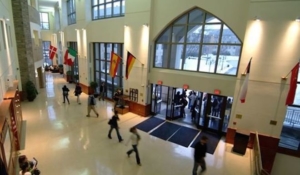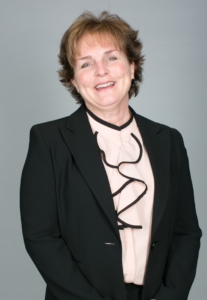
Inside the Bartley Atrium at the Villanova School of Business. Photo courtesy of Villanova School of Business
From financial services firms flipping undergraduate recruiting on its head with accelerated recruiting practices to the explosive increase in companies seeking grads with data analytics skills to the rise in virtual job interviews (a trend that’s abhorred by most students, by the way), Brenda Stover has her finger on the pulse of it all. As executive director of the Center for Professional Development at the Villanova School of Business, it’s her job to help students land their dream job (or internship) and navigate the ever-evolving world of career planning and development.
It’s a complex world she’s in and, admittedly, she often worries about losing sight of the fundamentals of professional development. That and being unable to fully tap into the endless opportunities that exist for students careers-wise. Nevertheless, Stover — who has been in the career advising business at Villanova more than 15 years — says she’s inspired and motivated by the students she serves and that’s what drives her to help them achieve professional success.
In 2017, VSB — ranked 17th on Poets&Quants Best Undergraduate Programs of 2017 — saw close to 94% of its graduating class employed within six months of graduation. What’s more, the newly minted alumni earned an average starting salary of nearly $63,000. Stover says the school’s top recruiters include the Big Four accounting firms as well as financial services firms and bulge bracket banks. Outside of accounting and financial services, Johnson & Johnson and IBM seem to favor Villanova’s business grads. Stover also proudly reports that the school is beginning to make headway with Moelis & Company, a highly competitive boutique investment bank that recently opened its doors to VSB students thanks to alumni who are currently there. These and other trends at Villanova — and in business education more broadly — are discussed in an in-depth interview conducted by Poets&Quants for Undergrads.

Brenda Stover, executive director of the Center for Professional Development at the Villanova School of Business
P&Q: Previously, you spoke to Poets&Quants about freshman and sophomore recruiting on the rise within the business school, has that trend slowed down at all?
Stover: No. In fact, it’s accelerated even more. Bulge bracket banks pushed the start of competitive divisions like investment banking and opened and closed their window during this spring semester for summer 2019 internships. Moelis & Company, a boutique, but very competitive bank had four of our students go through super days and two have already been made summer 2019 offers and accepted them. But this is mostly for the highly competitive divisions. Some organizations are just now starting their recruiting for other divisions such as sales, trading, and operations.
P&Q: How has this trend impacted your role at the business school?
Stover: It’s now critical that we are purposeful in our interactions and the programs we deliver with all four years of students. It’s not like when I started in the center in 2002. Then, our primary focus was on juniors. Now, we need to start coaching at the beginning of freshman year as students can have a chance to interact with employers literally their second day on campus. This was the impetus for our Backpack to Briefcase program which integrates professional development throughout the four-year curriculum.
The ante has been upped and it’s about staying ahead of the curve. You can’t relax, but you have to constantly be on top of it. In our office, we recently went through benchmarking and we’re looking to see what companies are doing with their employees professional development-wise so that we can get ahead of the curve. It used to be that you look at peer schools, but we don’t want to be doing the same thing anymore. We want to make sure we’re delivering resources so our students have a point of distinction from other institutions.
P&Q: How are business schools handling this trend? Are people discussing it or pushing back on employers?
Stover: Amongst career professionals, yes, there’s discussion. Just last week a conference was hosted by the National Association of Colleges and Employers. We had two people from our university’s career center speak on a panel with colleagues from other institutions and an employer talking about the accelerated process. People are at least talking about it, but there’s been no pushback on companies.
P&Q: Because of the extremely early pipelining that companies are doing, how do you advise students on whether to go all in with one organization or to continue exploring other opportunities?
Stover: It’s more art than it is science. And it’s also on a case-by-case basis. What can be a likely result is that reneges happen which banks hate so we need to have conversations with our students. We start it early with Backpack to Briefcase reminding them to be thoughtful throughout the process and that they have as much say as an employer does. This is a two-way street. We encourage them to talk with us about all angles of an offer before they accept it so we can talk through the implications and obligations once they accept an offer. When students renege, we have to play clean up as employers get upset.
P&Q: Do students grasp the concept of this being a two-way street?
Stover: Some do at some point, but they’re still 19 and 20 years old and they have this fear that they can’t poke the bear. They feel like they’re the ones in the submissive position. Some of that is just developmental and we need to talk them through it. For others, it may be the student’s personality and we’ll work to coach them.
P&Q: Are there any advantages for your business students since your program is four years as opposed to two or three?
Stover: Definitely. Our advantage is that our conversations not only start early, but they’re able to carry over into the classroom with our business school faculty who are also encouraging them to get started early. Our various business societies and student clubs also work to educate students about the timeline and rapid recruiting process.











Questions about this article? Email us or leave a comment below.